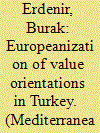| Srl | Item |
| 1 |
ID:
137609


|
|
|
|
|
| Summary/Abstract |
This essay analyzes the change in value orientations of Turkish society in recent decades with reference to the Europeanization process the country has been going through, particularly that embodied in the European Union accession process. As the Europeanization of Turkish political culture is closely related to the consolidation of democracy, the change in value orientations sustaining democracy would be an indicator showing the extent of societal Europeanization in Turkey. Based on the World Values Survey, changes in secular-rational and self-expression value orientations of Turkish society are examined vis-à-vis those dominant in European societies. Levels of religiosity, interpersonal trust, and social tolerance are selected for cross-cultural comparison. The essay elaborates on the reasons Turkish society has been diverging from European societies on value orientations at a time when the country has been experiencing a vast socioeconomic change, with millions of people moving into the middle class.
|
|
|
|
|
|
|
|
|
|
|
|
|
|
|
|
| 2 |
ID:
140080


|
|
|
|
|
| Summary/Abstract |
It is argued that threat related to territorial civil wars generates negative interpersonal attitudes that are both more intense and more broadly oriented than previously thought. That is, civil wars fought over issues of autonomy or secession foment social intolerance, a broad orientation that extends well beyond members of former enemy groups to an aversion to interpersonal differences in general. The expectation that the issue the civil war is fought over is consequential is tested with data from the World Values Survey and the UCDP/PRIO Armed Conflict Dataset. The empirical domain consists of over 130,000 individuals across 123 surveys in 69 countries over the 1989–2008 period. Results from multilevel models indicate a positive and statistically significant relationship between domestic territorial conflicts and subsequent social intolerance. Substantively, territorial civil wars have a far greater impact on individuals’ attitudes than do ‘standard’ correlates of social intolerance that are well established in the literature. Further, non-territorial civil war is unrelated to attitudes of social intolerance. Empirical results are robust to several model specifications and are not a mere artifact of the potential reverse relationship, whereby intolerant societies are (erroneously) presumed to be at a higher risk of civil wars in the first place. The findings have implications for the understanding of civil war resolution, civil war reoccurrence, and the contextual correlates of interpersonal intolerance.
|
|
|
|
|
|
|
|
|
|
|
|
|
|
|
|
| 3 |
ID:
161477


|
|
|
|
|
| Summary/Abstract |
Most empirical studies report that religious people are less likely to be tolerant in social or political life. This study, however, claims that rather than religiosity per se, adherence to a textualist-traditionalist understanding of Islam, which is based on a literal reading of the sacred texts and a heavy reliance on the tradition, and which generates timeless and absolute standards of good and bad conduct, leads to social intolerance towards members of out-groups. Religious commitment exacerbates intolerance in the case of textualist-traditionalist believers, but not necessarily in the case of non-textualists. These arguments are tested on a sample of the Sunni population from Turkey by using the July 2012 data-set of the KONDA Barometer series. The analysis points to two different mind-sets generating distinct tolerance attitudes.
|
|
|
|
|
|
|
|
|
|
|
|
|
|
|
|